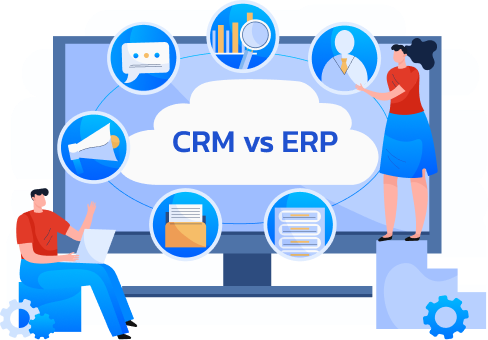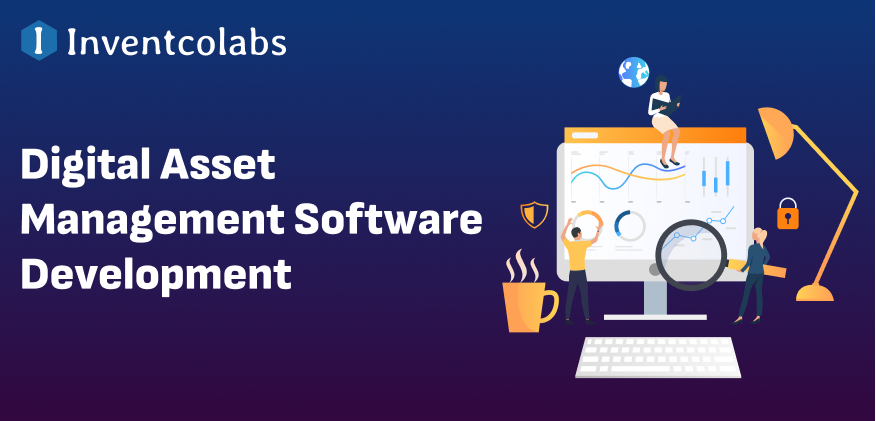Are you struggling to stand apart in today’s highly competitive environment? Looking for ways to streamline your business processeas, enhance customer satisfaction, and direct growth in a competitive landscape? Custom CRM and ERP are the two most fundamental tools to help businesses to overpower these challenges.
A customer relationship management system (CRM) enables businesses to strengthen customer relationships by offering personalized customer experiences and boosting sales. According to Martech, CRM increases sales by 29%, productivity by 34%, and accuracy by 42%.
Enterprise Resource Planning (ERP), can assist businesses facilitate operations, eradicate data silos, and equip real-time insights to enable businesses to create informed decisions.
So, which one should you choose: CRM vs ERP? Here in this blog, we’ll compare these two and help you choose the one that is best suited to your business.
So, let’s get started.

What is CRM?
Customer relationship management (CRM) facilitates organizations to collect and manage data to simplify relations with customers.
CRM software has tools and capabilities to collect and organize sales, marketing, and service teams to help businesses amplify relationships with customers.
Salesforce, Zoho, HubSpot, Zendesk–and the list goes on, are some of the leading customer relationship management software available in the market.
Customer relationship management software is also used to centralize customer data to make sure businesses can easily use the information.
Functions of CRM Software
Here we have outlined some of the key functions of CRM software: 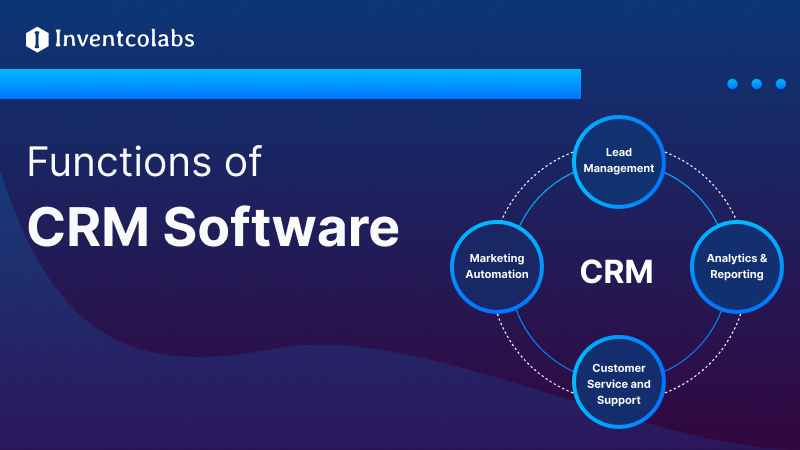
> Lead Management
CRM software helps businesses to manage the leads by centralizing all the lead data from all sources like social media, web, email, and so on. CRM can track lead information, and prospects’ interaction with the business, and nurture them to convert into sales. Custom CRM solutions can also help you build automated lead management functions such as lead scoring to help businesses identify the leads that are most likely covert.
> Marketing Automation
Customer relationship management system also supports marketing automation. So businesses can automate repetitive marketing tasks such as writing email campaigns, lead nurturing, and customer segmentation to ensure highly targeted marketing. This function enables the business to maximize efficiency to drive results from marketing campaigns.
> Customer Service and Support
Another function of CRM software is that it enables businesses to manage and support customer service & support. CRM keeps track of customer information in a centralized place. This can help the support team to readily access the customer data and provide more personalized support to customers, resulting in enhanced customer experience. This helps customers build long-term relationships with customers.
> Analytics and Reporting
The most significant function of CRM lies in its analytics and reporting capabilities. CRM offers deep insights into customer interaction to enable businesses to identify areas of improvement. For instance, by identifying the trends in customer complaints, businesses can find ways to address them proactively.
Explore More: Property Finder App Development – Cost & Features
Benefits of Custom CRM Software
Here we have mentioned some of the most common benefits of CRM software: 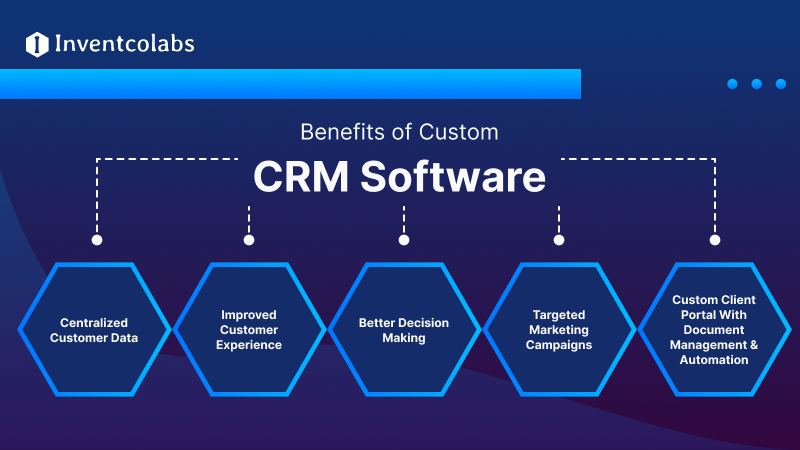
> Centralized Customer Data
Data silos are one of the most common challenges faced by businesses. CRM has the benefit of centralizing customer data. This means all your customers will be stored in one place making it easier for you to visualize the data to find insights into customer behavior and preferences. This information can be used to help you find ways to improve your products and meet customers’ expectations.
According to a study conducted by CDP, organizations that have invested in centralized customer data experienced a 64% increment in their efficiencies, 57% more business growth, 41% reduction in risk, and 32% lower cost. These statistics say that centralized customer data is the need of the hour for organizations to sustain and thrive in today’s competitive environment.
> Improved Customer Experience
The role of customer experience is essential to the success of a business. CRM software solutions are qualifying businesses to manage customer information like purchase history, preference, communication history, and so on. With this data, businesses can easily pinpoint the customer’s needs and customize their interactions, making them valuable.
According to Martech, businesses using CRM systems recorded a 17% increase in lead conversions, a 16% boost in customer retention, and a 21% improvement in agent productivity due to the easy availability of data.
> Better decision-making
CRM software equips businesses with real-time access to customer data authorizing businesses to adjust their products and services to correspond to customers’ requirements reasonably.
According to a study conducted by CRM.org, 58% of businesses using CRM software said that CRM helped them to make better decisions. Also, businesses experienced 14.6% improvements in productivity with mobile accessibility of CRM.
For example, an eCommerce business utilizing CRM software can gain deep insights into customer buying habits and market demands. This data will help the eCommerce business to manage inventory to meet customer needs, and better pricing strategies to ensure better revenue.
> Targeted Marketing Campaigns
CRM software solutions equip businesses with the essential tools and insights required to create highly targeted marketing campaigns. For instance, with customer segmentation, businesses can create a group of customers who share similar interests, ages, demographics, preferences, behavior, or any other specific criteria to create targeted marketing campaigns at scale.
According to a study conducted by Campaign Monitor, targeted marketing campaigns can generate a 760% increase in revenue compared to generic marketing campaigns.
> Custom Client Portal With Document Management and Automation
The CRM system also has a custom client portal with document management and automation that make it easy to handle document management, so your sales team focuses more on winning clients. Custom client portals also ensure centralized access to all documents.
What is ERP?
ERP, or Enterprise Resource Planning, is a comprehensive business management system that helps organizations streamline and integrate various key processes and departments. It acts as a centralized database where different functions like finance, human resources, inventory, manufacturing, and customer relationship management are combined into a single software platform. This results in improved productivity, informed decision-making, and optimized overall operations.
In simple terms, ERP brings together different parts of a business into a unified system, making it easier to manage and coordinate important aspects of operations such as finances, human resources, inventory, and customer relationships.
Explore More: How To Build A Point Of Sale (POS) System – Complete Guide
Functions of ERP Software

> Streamlined Operations
Let’s face it – business processes can sometimes resemble chaotic routines. ERP software steps in with its ability to support organizations streamline their operations. From managing orders and tracking inventory to planning production and optimizing workflows, ERP maintains everything in sync. It’s like having a virtual assistant leading your business to success.
> Financial Management
ERP software takes care of the headache of financial management by automating redundant tasks like bookkeeping, invoice generation, and expense tracking. It’s like having a professional who efficiently calculates numbers allowing you to concentrate on strategic tasks that demand your expertise.
> Supply Chain Management
Managing a supply chain can feel like a never-ending game. ERP software is here to be your strategic mastermind, providing smooth inventory management, efficient order fulfillment, and timely supplier partnerships. It’s like having a supply chain superhero who consistently finds the right puzzle pieces to support your processes executing seamlessly.
> Reporting and Analytics
With insightful dashboards and reports, ERP enables you to find hidden patterns, track performance metrics, and make data-driven decisions. It’s like having an intelligent advisor directing you through the business maze, making sure you always choose the right path
Benefits of ERP Software
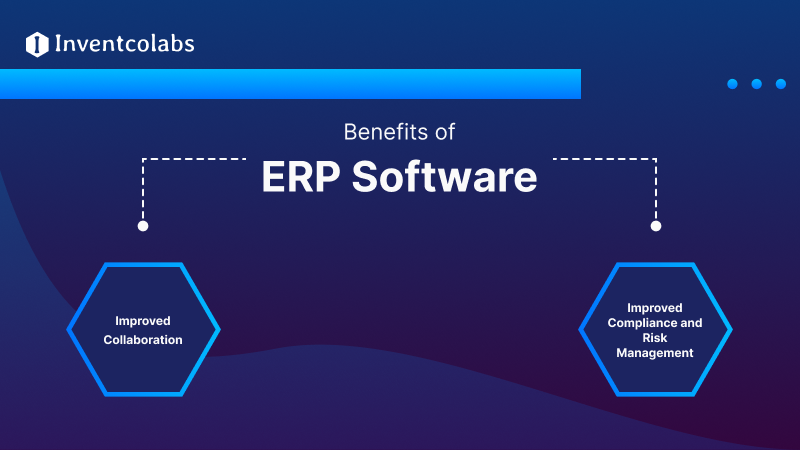
> Improved Collaboration
The biggest benefit of ERP software is that it improves the collaboration between the different departments of an organization. They can connect with each other and share information, trade ideas, and jointly uncover new paths to expand.
According to a study conducted by Frost & Sullivan, the businesses that have improved collaboration are 36% more innovative. Another study finds that businesses with improved collaboration managed 4.5 times higher talent retention. For example, a manufacturing company can empower cross-departmental collaboration between production, sales, and support teams. They can share real-time information, coordinate activities, and work together seamlessly to satisfy customer needs and maximize production schedules.
Explore More: How to Develop A Ride-Sharing App? Key Features & Cost
> Improved Compliance and Risk Management
Another benefit of the Enterprise Resource Planning system is that it enables businesses to keep up with regulations and industry standards, lowering risks and assuring data security.
According to a study conducted by PwC: 68% of executives believe compliance and risk management as a key driver for implementing ERP systems.
For example, an organization in the healthcare sector using ERP software can maintain compliance with HIPAA regulations. The system provides access controls, encryption mechanisms, and audit trails to protect patient data, minimizing the risk of data breaches and ensuring regulatory compliance.
Custom CRM vs. ERP: Detailed Comparison
Custom CRM vs ER, both are different types of software that help businesses to manage different aspects. A detailed comparison of both will allow you to determine their differences:

Custom CRM vs ERP: Functionality
Custom CRM is focused on managing customer data and enabling organizations to use the data to create a personalized experience. On a broader view, CRM helps businesses to track leads, manage the sales pipeline, and provide efficient customer support.
On the other hand, an ERP system satisfies the diverse needs of a business such as financial data management, streamlined supply chain processes, inventory management, and optimizing human resources. The ERP system also integrates the various departments of an organization to work together to achieve success.
Custom CRM vs ERP: Deployment
Custom CRM solutions offer businesses the flexibility to decide between cloud-based or on-premises deployment options. Cloud-based CRM software allows easy accessibility from anywhere with an internet connection, while on-premises deployment delivers more significant control over data security and customization.
In contrast, custom ERP solutions are generally deployed on-premises, demanding local infrastructure and dedicated IT resources for implementation and maintenance. This deployment approach equips organizations with more control over their data and customization options, providing specific operational requirements and data security priorities.
ERP vs CRM: Cost
CRM solutions typically have lower upfront costs compared to ERP solutions, making them more affordable for businesses with limited budgets. However, the cost of customization for CRM software can vary based on the scope of customization needed. On the other hand, ERP solutions are typically more costly due to their more comprehensive functionality and qualities. The cost of ERP implementation includes licensing, customization, hardware infrastructure, and continuing maintenance. It is important to carefully consider the specific needs and budget of your business, regarding the potential return on investment (ROI) each solution can provide.
ERP vs CRM: Ease of Use
CRM solutions are developed with a user-friendly interface and intuitive navigation, making them more effortless to adopt and use for sales and customer service teams. Custom CRM systems are often tailored to distinct industry needs, streamlining processes and allowing quick user onboarding.
In contrast, ERP solutions may have a more vertical learning curve due to their more comprehensive functionality and complex business processes. Extensive training and change management efforts are often needed to ensure employees can completely use the system’s abilities.
CRM vs ERP: Customization
Custom CRM solutions offer a range of customization choices to meet specific business requirements. These options include managing customer data and interactions, designing automation, and integrating with various tools and systems.
On the other hand, custom ERP solutions allow organizations to customize the system to their specific needs. This customization may involve modifying form layouts, menus, product lines, integrations, business process automation, and developing additional functionalities. It is important to carefully evaluate customization requirements, ensuring they align with the organization’s operational needs while balancing implementation time, costs, and long-term maintenance considerations.
Which Do You Need: CRM or ERP
Let’s have a quick recap of comparison to figure out which you need: CRM or ERP:
| Comparison Aspects | CRM | ERP |
| Functionality | Focuses on customer interactions, sales, and support. | Covers broader business functions such as finance, supply chain, inventory, and HR. |
| Deployment | Can be cloud-based or on-premises. | Typically deployed on-premises. |
| Cost | Lower upfront costs. | Higher costs due to comprehensive features. |
| Ease of Use | User-friendly interface. | May have a steeper learning curve. |
| Customization | Tailored to manage customer data and interactions. | Customizable to meet specific business needs across multiple functions. |
To determine which solution you need, consider your primary focus. If you primarily deal with customer interactions and sales, CRM would be more suitable. If you require comprehensive management of various business functions, ERP would be the ideal choice. Assess your specific requirements, budget, and long-term goals to make an informed decision.
Explore More: Automotive Software Development Guide – Cost & Features
Conclusion
The decision between CRM and ERP depends on your business needs. If you prioritize customer interactions and sales, opt for CRM software development. On the other hand, if you require comprehensive management across multiple functions, consider ERP system development. To ensure successful implementation, it is advisable to partner with a reliable CRM or ERP software development company. They can provide expertise, customization options, and ongoing support to tailor the solution to your unique requirements. Choose a trusted CRM software development company or ERP software development company to unlock the full potential of these powerful systems and drive business growth.
FAQ
Q1. Can a business use both CRM and ERP systems simultaneously?
Ans. Yes, a business can use both CRM and ERP simultaneously. In fact, it is suggested as the best practice for businesses to integrate both CRM and ERP. This integration helps both systems to share data with each other to enable organizations to reduce costs, improve customer experience, and make better decisions backed by data.
Q2. What is the difference between CRM and ERP?
Ans. CRM vs ERP both serve different business purposes. ERP system is primarily used by businesses to manage finance and other resources to drive maximum value for businesses with less investment. While, on the other hand, CRM is used to help businesses improve their relationship with customers.
Q3. How to choose the right CRM and ERP software development company?
Ans. You should consider a few things while hiring the right CRM and ERP software development company. The very first thing you should consider is experience and the company’s portfolio to evaluate expertise to develop custom CRM and ERP solutions. You can also refer to client reviews and testimonials to make sure you’re choosing the right company.
